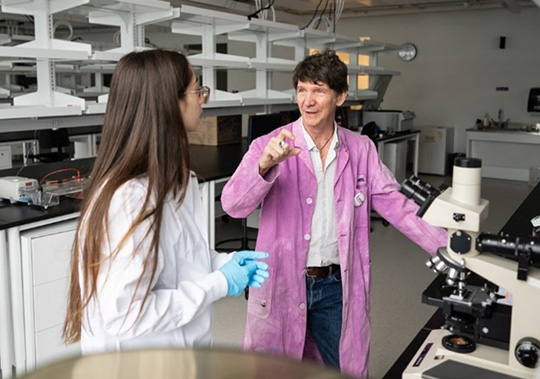Unlocking a mystery: How a healthy microbiome protects babies from chronic inflammation

Why does a sanitized environment protect us from infections but seem to increase the chances of developing chronic inflammatory diseases such as asthma and eczema? Why does exposure to some bacteria appear to make us less prone to these diseases? For years, Dr. Kelly McNagny at University of British Columbia has searched for answers by studying how the microbiome—the trillions of microorganisms that mostly live in our digestive tract—influences our health.
In 2012, Dr. McNagny and colleagues found that changes in the microbiome early in life led to inflammatory responses. How exactly that happened remained a mystery until the discovery of innate lymphoid cells, a special group of immune cells that respond to environmental factors and settle in our tissues during the first years of life. Wanting to know if these cells and the microbiome were connected in making us susceptible to chronic inflammatory diseases, Dr. McNagny and his team set to work on animal trials.
From 2017 to 2024, they discovered that protective bacteria living in the microbiome of newborn mice produce butyrate, a chemical that regulates these innate lymphoid cells. When newborn mice received an antibiotic that disrupted their microbiome, innate lymphoid cells became hyperactive, causing long-term inflammation in their lungs. The good news? A simple butyrate supplement helped reduce inflammation if given at or around the time of antibiotic exposure.
By revealing how early bacterial exposure—through vaginal birth, breastfeeding, older siblings, or growing up on a farm—indirectly contributes to shaping the immune system, these studies make us rethink how we see chronic inflammatory diseases. As Dr. McNagny explains, “Without a healthy microbiome early on, our innate lymphoid cells could be primed and stay overactive for the rest of our life.”
These findings also challenge excessive antibiotic treatments in babies and young children. More research is still needed to identify protective bacteria in our microbiome and to develop targeted antibiotic treatments, but Dr. McNagny’s message is clear: “Future research could guide doctors to prescribe antibiotics that fight off harmful bacterial infections without damaging the healthy microbiome that babies get at birth.”
Dr. McNagny is now collaborating with the CHILD Cohort Study, which involves 3,500 kids and their families across Canada, to better understand when innate lymphoid cells are amplified in kids and to determine the right time to make a medical intervention.
It may be too early to draw conclusions about how changes in a child’s microbiome affect chronic diseases, but Dr. McNagny’s findings provide practical insights into leading a healthy life: “We need to be paying more attention to nutrition and exposure to microorganisms in early life that could prevent us from getting chronic diseases in adulthood.”
At a glance
Issue
For decades, researchers suspected that our microbiome shapes our immune system, making us more or less prone to chronic inflammatory diseases.
Research
Through three studies in mice, Dr. Kelly McNagny discovered that some bacteria found in the microbiome help regulate special immune cells that settle in tissues after birth. However, when the microbiome is disrupted by antibiotics early in life, these cells become overactive for life, causing long-term inflammation.
- Date modified: